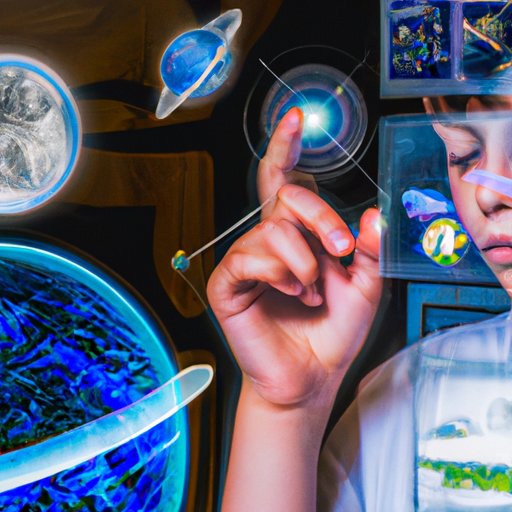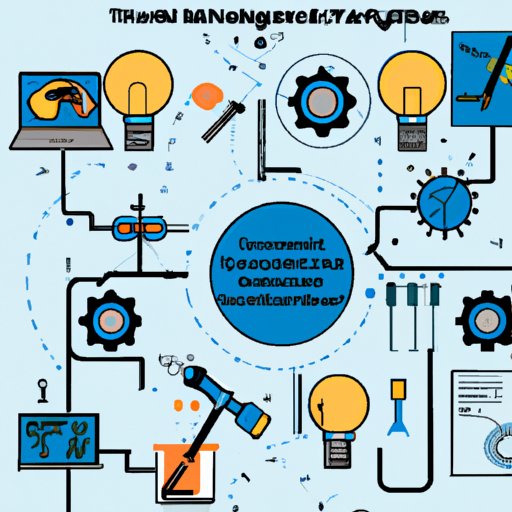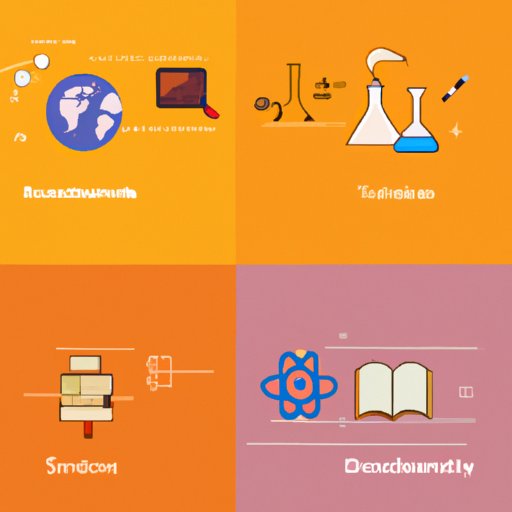Introduction
Science and technology are two closely related fields that have a profound impact on our lives. Science refers to the systematic study of the natural world, while technology is the application of scientific knowledge for practical purposes. The purpose of this article is to explore the differences between science and technology, examine their impact on our lives, and consider the implications for the future.
A Comparative Study of Science and Technology
In order to understand the relationship between science and technology, it is important to first consider the definitions of both. Science can be defined as “the intellectual and practical activity encompassing the systematic study of the structure and behavior of the physical and natural world through observation and experiment” (Oxford Dictionary). Technology, on the other hand, is “the application of scientific knowledge for practical purposes, especially in industry” (Oxford Dictionary).
To further illustrate the differences between science and technology, we can look at some examples. Science involves the systematic study of the natural world, and its findings can help us to better understand the universe. For example, physicists have used scientific methods to gain insights into the structure and behavior of matter, and biologists have used scientific methods to study the evolution of life on Earth. Technology, on the other hand, is the application of scientific knowledge for practical purposes. Examples include the invention of computers, smartphones, and medical treatments.
The comparison of science and technology highlights their interdependence: science provides the theoretical framework for technological advancement, while technology provides the tools for scientific progress. This synergy has enabled humanity to make tremendous advances in both fields.

Exploring the Impact of Science and Technology on Our Lives
The advances made in science and technology have had a major impact on our lives. On the one hand, these advances have had positive impacts, such as improved health care, increased agricultural productivity, and improved communication. On the other hand, there have also been negative impacts, such as environmental pollution, resource depletion, and the proliferation of weapons of mass destruction.
It is clear that science and technology have both positive and negative impacts on society. In order to ensure that the benefits outweigh the risks, it is important to ensure that scientific research and technological developments are conducted responsibly.

An Overview of Scientific Research and Technological Development
In recent years, there have been many exciting developments in both science and technology. In the field of science, researchers have made significant advances in understanding the human genome, decoding the secrets of the universe, and uncovering the mysteries of the brain. In the field of technology, engineers have developed new materials, created powerful computing devices, and designed driverless cars.
These advances have opened up new possibilities for humanity, and have helped to shape the modern world. They have also raised important ethical and social questions about the use of science and technology.
What is the Relationship Between Science and Technology?
The relationship between science and technology is complex and intertwined. As noted earlier, science provides the theoretical framework for technological advancement, while technology provides the tools for scientific progress. This interdependence has enabled humanity to make tremendous advances in both fields.
In addition to their interdependence, science and technology also have a synergistic relationship. As technological advancements enable the collection of more data, scientists are able to develop more accurate models and theories. Similarly, as scientific discoveries reveal new phenomena, engineers can design new technologies to exploit them.
Examining the Role of Science and Technology in Education
In order to ensure that future generations are well-equipped to face the challenges of the 21st century, it is essential to integrate science and technology into education. By incorporating science and technology into the curriculum, students can gain a deeper understanding of the world around them and develop critical thinking skills.
However, integrating science and technology into education is not without its challenges. One of the main challenges is ensuring that teachers are adequately trained to deliver the curriculum. Another challenge is finding ways to make science and technology engaging and relevant to students.

The Use of Science and Technology to Address Global Challenges
The world is facing many complex global challenges, such as climate change, poverty, and disease. To address these challenges, it is essential to leverage science and technology. By harnessing the power of science and technology, we can develop innovative solutions to global problems.
For example, scientists are using genetic engineering to develop crops that are resistant to drought and disease. Engineers are using artificial intelligence to create robots that can assist in disaster relief operations. And technologists are developing renewable energy sources to reduce dependence on fossil fuels.
Conclusion
In conclusion, this article has explored the differences between science and technology, examined their impact on our lives, and considered the implications for the future. We have seen that science and technology are closely related, and that they have a synergistic relationship. We have also seen that they can be used to address global challenges. Finally, we have discussed the importance of integrating science and technology into education.
The advances made in science and technology have already changed the world, and will continue to do so in the future. How we use science and technology will determine our collective fate, and it is essential that we use them responsibly and ethically.
(Note: Is this article not meeting your expectations? Do you have knowledge or insights to share? Unlock new opportunities and expand your reach by joining our authors team. Click Registration to join us and share your expertise with our readers.)
